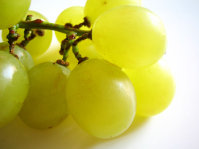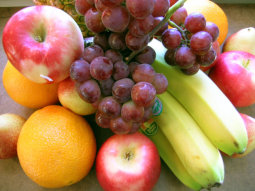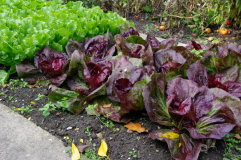How To Go Organic – The Basics Of Organic Gardening

Organic gardening is the new black. Well actually it’s probably in vogue from at least a few seasons ago, but it’s still a wonderful way to grow plants that you and your family can enjoy. This one isn’t going out of fashion anytime soon. Organic gardening is better than traditional gardening because it’s healthy for both humans and the earth.
Table of Contents
What Is Organic Gardening?
Organic gardening is different from traditional gardening in one major way – it is powered by natural processes instead of synthetic additives. On one level, this means that an organic gardener uses animal and vegetable fertilizers instead of chemically produced ones. It also means abstaining from the use of industrial pesticides and instead relying on natural pest control. In addition to these basics, another fundamental element of organic gardening is the proper choice of crops and the associated effective rotation of these crops throughout the year. In this way, a gardener can tap into the natural properties of the plants to build a nutrient-rich soil.
Tried and Tested
 Organic gardening methods were a mainstay of the human race for many years, including the hyper-growth period between the Agricultural Revolution and up until the mid-1800’s, at which point industrial agricultural chemicals were developed. In the last 50 years, there has been some resurgence in the idea of moving away from gardening with chemicals and back towards working with the earth on a natural level.
Organic gardening methods were a mainstay of the human race for many years, including the hyper-growth period between the Agricultural Revolution and up until the mid-1800’s, at which point industrial agricultural chemicals were developed. In the last 50 years, there has been some resurgence in the idea of moving away from gardening with chemicals and back towards working with the earth on a natural level.
The Benefits Of Organic Gardening
One of the main benefits of organic gardening is that crops can be grown without killing off the surrounding ecosystem and destroying the natural balance of the environment in the process. Although the scorched earth method may deliver results in the beginning, overtime it wears down and depletes the soil, whereas organic gardening not only maintains the balance but also leads to more productive soil in the future.
What’s more, although somewhat subjective, it can be argued that organic gardening also produces food that is both healthier and tastier. This is because organic plants are grown in soil that has a proper balance of nutrients, and which therefore produces stronger plants and food that have absorbed those healthy nutrients in high amounts.
 Nevertheless, probably the greatest benefit of organic gardening is that it reduces the health risk of using chemical pesticides. This isn’t to be understated, as chemical pesticides have now been shown to be carcinogenic. Combine this with the fact that organic gardening also prevents pollution of groundwater with toxic chemicals and you’ve got a pretty compelling set of benefits.
Nevertheless, probably the greatest benefit of organic gardening is that it reduces the health risk of using chemical pesticides. This isn’t to be understated, as chemical pesticides have now been shown to be carcinogenic. Combine this with the fact that organic gardening also prevents pollution of groundwater with toxic chemicals and you’ve got a pretty compelling set of benefits.
All Natural Fertilizers
Where do all natural fertilizers come from? Unsurprisingly, they come from both animal and vegetable sources. Animal fertilizer for organic gardening is made from the fermented waste of animals, most notably cattle and poultry. By fermenting these animals’ manure, it increases the nutrient value and this is then passed on to the plants. Poultry such as chicken is often chosen as a source because their droppings are dense and full of nitrogen, which is good for the soil. However, beyond cows and chickens there are many types that can be used, such as bat guano, fish waste or bone meal (powdered animal bones).
The most popular way to create wonderful vegetable fertilizer is through composting. Compost is made in an enclosed area where household and yard wastes are mixed together and stored. When combined this way, microorganisms can quickly and easily break it down, giving it the nitrogen that it needs. There’s quite an art to creating good compost, so if you’re interested then you’ll want to do some more research.
Nature’s Pesticides
 There are several ways to control pests naturally. One is to use good fertilizer and rotate crops regularly; gardens with only one crop are just asking for trouble. Do some research into the great potato famine of Ireland to see what we’re talking about. Another method is to stock the garden with insects that eat pests, such as ladybugs, praying mantises and certain types of wasps. There are also all-natural organic sprays that use common household goods such as canola oil, peppers, and baking soda. Or you can also build insect traps using plastic containers and a little bit of that good old fashioned household favourite – beer!
There are several ways to control pests naturally. One is to use good fertilizer and rotate crops regularly; gardens with only one crop are just asking for trouble. Do some research into the great potato famine of Ireland to see what we’re talking about. Another method is to stock the garden with insects that eat pests, such as ladybugs, praying mantises and certain types of wasps. There are also all-natural organic sprays that use common household goods such as canola oil, peppers, and baking soda. Or you can also build insect traps using plastic containers and a little bit of that good old fashioned household favourite – beer!
If you haven’t tried organic gardening before then perhaps it’s time to give it a shot. The methods have been honed to perfection over the millennia, so the reality is that it works well, plain and simple. Chances are that with the increased awareness in the health effects of our food choices we’ll see organic gardening taking much more of a centre stage in the years ahead.
We hope you’ve liked this organic gardening article, brought to you by United Home Services, one of Australia’s largest cleaning franchises. Take a look at their article on Five Amazingly Cheap and Easy Eco Cleaning Ideas for more great tips.

Well organic gardening has going everywhere in the world. Daily I see more new gardeners here in our country.As for me I have only grown some vegetable items like tomatoes eddo plants,potatoes.
Hi Drip,
that’s the way to go. We grow our own organic apples, and guess what – they are the best source for our organic apple juice we consume during the year.
Organic is the way to go, if for no other reason the taste is better. But I think there is a little bit more satisfaction in growing organically.
Tyler, you are so right. The satisfaction is both of physical and moral nature. It is great to go organic.
Some people may not realize they already have an organic garden. I never spray my vegetables nor would I ever think to do so. I love fruits and vegetables that are grown without any man made additives. Organic just taste better!
You are so right Carole! Our garden is totally organic as well and it will never ever see any kind of man made fertilizers, synthetic additives, pesticides …
I started an organic garden about a year ago (with the help of a true gardening expert, my dad!) and I absolutely noticed the difference. I’ve always been able to tell the difference between organic tomatoes and some of the awful once you get at a store or in a restaurant. But through my garden I realized what a difference organic lettuce can make! I think there is a taste difference though I’m not sure it’s as apparent as with tomatoes… but what was apparent was how much better my body felt from eating it!
My advice to anyone who’s starting for the first time is to start small and start with fruits/vegetables you really enjoy 🙂
Hi Lance,
Yes, you are right – this is one of the best examples to feel and taste the difference. There is such a huge distinction between the organically and conventionally grown tomatoes, both in terms of taste (did we mention smell?) and in terms of nutritional and health benefits. It is such a pity the majority of people are denied the possibility to enjoy the gifts of nature the way they were designed originally.
Making compost is not really that difficult. If you have plant material in a pile, it will eventually turn into compost. The difficult part is speeding up the process of making compost. If you don’t do it right, it could take a year or more. If you do it perfectly, it could be ready for use in your garden in less than a month.
Hi Bill,
Thanks for this information. Any quick tip you can give us on speeding up the process?
We are working on getting my daughter involved in recycling and composting wherever possible and these would be a great addition to our arsenal.
what’s the big fuss about organic foods? are they really so different, i don’t think so.
Hi inorganic,
Yes there is a big difference in that the organic foods are grown without the use of insecticides and pesticides. This is really important, given the fact that there are more than half a million known chemical pesticides, and some of them are being used indiscriminately. Out of this number, only something like a couple of thousands of pesticides have been tested for cancer causing potential, and many of the tested ones have been proven to cause cancer in animals. So, yes, I would always choose organic (and non-GMO btw.) produce whenever I had the choice.